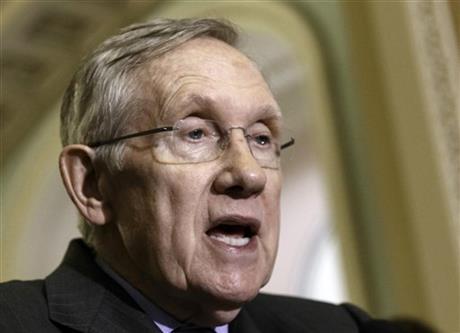
By ANDREW TAYLOR
FILE – This June 10, 2014 file photo shows Senate Majority Leader Harry Reid of Nev. speaking on Capitol Hill in Washington. The Senate’s top Democrat has yanked a $180 billion spending measure from the floor after the chamber’s top Republican protested a plan that would have denied Republicans the chance to more easily win changes to the measure. Reid pulled the measure after Minority Leader Mitch McConnell thwarted a move to require a supermajority 60-vote threshold for adoption of amendments to the measure. (AP Photo/J. Scott Applewhite, File)
Mitch McConnell
FILE – This June 3 2014 file photo shows Senate Minority Leader Mitch McConnell of Ky. speaking on Capitol Hill in Washington. The Senate’s top Democrat has yanked a $180 billion spending measure from the floor after the chamber’s top Republican protested a plan that would have denied Republicans the chance to more easily win changes to the measure. Majority Leader Harry Reid pulled the measure after McConnell thwarted a move to require a supermajority 60-vote threshold for adoption of amendments to the measure. (AP Photo/J. Scott Applewhite, File)
Prev
1 of 2
Next
WASHINGTON (AP) — In a major blow to efforts to get Congress’ troubled budget process back on track, the Senate’s top Democrat yanked a $180 billion spending measure from the Senate floor Thursday after Republicans protested a plan that would have denied them the chance to more easily win changes to the measure.
Majority Leader Harry Reid, D-Nev., pulled the bill after Minority Leader Mitch McConnell, R-Ky., thwarted a move to require a supermajority 60-vote threshold for adoption of amendments to the measure.
Reid was also a force in canceling committee consideration Thursday of a separate energy and water projects spending bill after McConnell appeared poised to win a vote aimed as an assault on new government rules on carbon emissions from existing coal-fired power plants.
Democrats feared that McConnell was also in a position to force a vote on the controversial carbon emissions issue on the floor measure, which appeared to be a major factor in Reid’s insistence on a filibuster-proof margin for amendments to that measure.
McConnell is a passionate defender of his state’s coal industry, and crusading against what he calls President Barack Obama’s “war on coal” is a big part of his campaign for re-election this fall. He’s eager for a vote on proposals to block the Obama administration from finalizing the rules.
“Not only do we not get votes on the floor, we don’t get votes in committee either,” McConnell said in a bitter floor exchange. “When do we start legislating again? What’s happened to the United States Senate?”
The combined events are a big setback for efforts to get Congress’ troubled appropriations process back on track. The chairwoman of the Senate Appropriations Committee, Barbara Mikulski, D-Md., has put considerable energy into trying to revive the appropriations process and won promises of floor debate from Reid. An aide said she’s still holding out hope that there’s a path forward for the huge spending bill, a hybrid measure that combines the budgets for the departments of Justice, Commerce, Agriculture, Transportation, and Housing and Urban Development.
“Today was disappointing but we aren’t done by a long shot,” Mikulski spokesman Vince Morris said. “We intend to roll up our sleeves and come back at this again next week.”
Thursday’s battle was the latest chapter in an ongoing struggle between Reid and McConnell over how the chamber is run. Reid has clamped down on the traditional right of freewheeling debate and amendment. He says it is McConnell who has forced a 60-vote barrier for virtually everything. The relationship between the two was further poisoned after Reid engineered a change in filibuster rules for confirming judges and other administration nominees.
Reid read a series of quotes in which McConnell had said that any important or controversial legislation requires 60 votes in the 100-member Senate.
“I want to have votes on the conditions that Sen. McConnell has so frequently stated,” Reid said. “The idea of a 60-vote threshold will not come as a surprise to anyone in this chamber.”
The underlying bill was a sweeping spending bill that would restore House GOP cuts to transportation grants, boost funding to ease a testing backlog of rape kits and a new NASA rocket, and provide small budget hikes for the FBI, while maintaining rent subsidies for the poor.
The bill included GOP proposals easing hours of service rules for long-haul truckers and allowing white potatoes to be included in the market basket for a food program for low-income pregnant women and their babies. It restored cuts proposed by Obama for community development grants.
Mikulski has used accounting moves to add money to the spending bills, irritating Republicans, but her quest to revive the Appropriations Committee’s stature has been hampered more by the broader battles over how the Senate is run.



